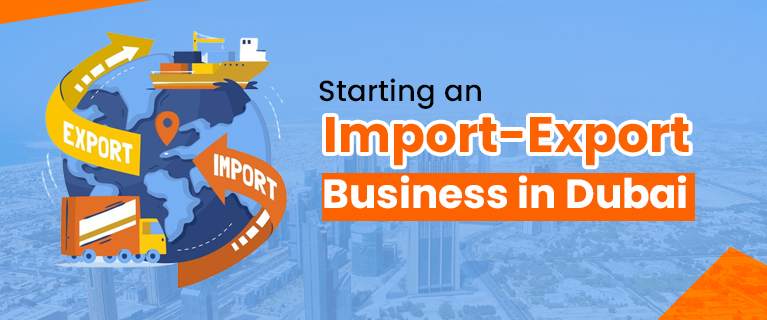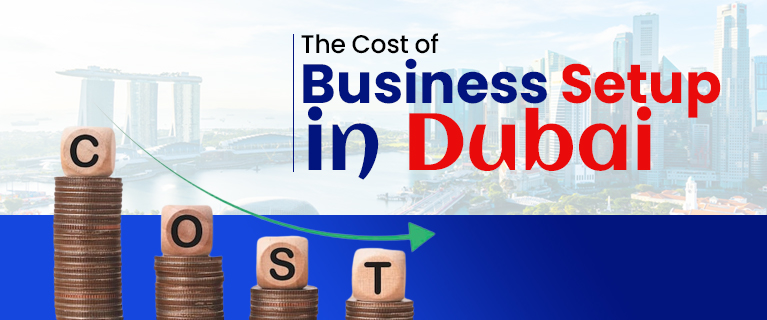Starting an Import-Export Business in Dubai
Dubai, a global trading hub with its strategic geographical location, stands as a beacon for import and export businesses. Situated at the crossroads of Africa, Europe, Asia, and the Middle East, Dubai’s connectivity to seaports and airways offers a gateway to international trade. The city’s efficient logistics network and proximity to major markets make it an ideal destination for import and export entrepreneurs. If you’re considering starting an import-export business in Dubai, this guide will walk you through the essential steps and documents required for a successful launch.
Read Also This – The Cost of Business Setup in Dubai
Steps to Start an Import-Export Business in Dubai:
1. Select Your Business Activity: The first step in establishing your import-export business in Dubai is to determine the nature of your business activities. Define the products or goods you intend to import or export. Dubai offers a wide range of trading opportunities, so identifying your niche is crucial.
2. Choose a Trade Name for Your Business: Selecting a suitable trade name for your business is essential. Ensure that the name complies with Dubai’s naming conventions and does not infringe on any trademarks. Verify the name’s availability and reserve it for your business.
3. Choose Your Business Location: You have the option to set up your import-export business in the mainland or a free zone. Evaluate the advantages of each location and choose the one that aligns with your business goals.
4. Complete Your Application and Pay the Fees: Prepare and submit your business license application. The application process may differ based on whether you are registering in the mainland or a free zone. Pay the relevant fees associated with your business license.
5. Receive Your License and Open a Business Bank Account: Once your application is approved, you will receive your business license. This license authorizes you to engage in import-export activities. Additionally, it is crucial to open a business bank account to manage your financial transactions.
Documents Required for Import-Export Business in Dubai:
To facilitate import and export activities to and from Dubai, you will need to provide several key documents to Dubai Customs. These documents include:
- Declaration Form for Import and Export: A comprehensive declaration form outlining the details of your import or export activities.
- Special Permit for Restricted Goods: If your business involves the import or export of restricted goods, you must obtain the necessary special permits.
- Delivery Order Records: Maintain accurate records of delivery orders, documenting the specifics of each shipment.
- Invoice with Merchandise Details: Present detailed invoices accompanying your imported or exported merchandise.
- Packing List: Provide a thorough packing list detailing the contents of each shipment.
- Certificate of Origin: Include the certificate of origin for your shipment, indicating the source of the goods.
- Trade License Copies: Submit copies of your trade license, demonstrating your authorization for import-export activities.
- DFSA Declaration by Dubai Customs Services: Comply with the regulatory requirements set by the Dubai Financial Services Authority in partnership with Dubai Customs Services.
Read Also This – Getting An HR Consultancy License In Dubai
Understanding the Import-Export Code in Dubai:
Before commencing your import-export business in Dubai, it is essential to be aware of the import-export code requirements:
1. Obtain a Trade License: Register your business with the relevant authorities in Dubai, either in the mainland or a free zone. Ensure that your trade license accurately reflects your intended business activities.
2. Customs Registration Clearance: Complete the customs registration clearance process to formalize your import-export operations.
3. Secure an Import-Export Code: Acquire an import-export code from the Customs Department, which authorizes you to engage in international trade.
4. Compliance with Trade License: Adhere to the limitations and conditions specified in your trade license, ensuring that your business operations align with the licensed activities.
5. Timely Delivery: Import and export goods must reach their destinations within the stipulated time frame, typically within 72 hours of the customs declaration.
6. Customs Clearance: All goods imported or exported must undergo customs clearance to comply with the relevant regulations.
Read Also This – Moving to Dubai from India
7. Customs Clearance Letter: Submit a customs clearance letter to the respective free zone authorities to store your goods in the warehouses, allowing you to trade in the UAE market.
8. Local Distributor for Free Zone Companies: If your import-export business operates within a free zone, consider appointing a local distributor if you intend to trade in the local UAE market.
How Much Cost Require Business Setup In Dubai
Launching an import-export business in Dubai is a cost-effective endeavour. While the specific costs may vary based on individual business requirements, we need to consider the following things:
Tax Considerations: If your goods are intended for sale in the local market of Dubai, you should account for a 5% duty on specific goods. Goods transiting from a free zone to the local market may be subject to this tax.
Regulatory Framework for Import-Export Businesses
Understanding the regulatory framework is vital for the successful operation of an import-export business in Dubai. The UAE’s Customs Department plays a central role in overseeing international trade activities.
Import and Export Duties
Import duties in Dubai are relatively low, with many items being subject to a 5% import duty. However, it’s crucial to stay updated on the specific tariffs and duties applicable to your products, as they can vary based on the product’s nature and origin. For export activities, Dubai does not impose export duties on most products. Research and consult customs authorities for precise duty rates relevant to your goods.
Tariff Classification
Proper classification of your imported or exported products is crucial. Each product is assigned a specific tariff code, also known as the Harmonized System (HS) code. Accurate classification ensures you pay the correct import duties and follow the relevant regulations.
Export Controls
Certain products, particularly those with dual-use applications (both civilian and military), are subject to export controls. Dubai adheres to international export control agreements and requires licenses for the export of controlled goods. It’s essential to identify if your products fall under this category and obtain the necessary permits.
Free Trade Agreements
The UAE has established free trade agreements (FTAs) with several countries to facilitate international trade. FTAs can impact the import-export business by reducing or eliminating import duties and simplifying trade procedures. Understanding and leveraging these agreements can be advantageous for your business.
Navigating Free Zones for Import-Export Business
Dubai offers a wealth of free zones, each catering to specific industries and trade activities. Here’s how you can explore free zones for your import-export business:
Read Also This – Guide To Set Up A Perfume Business In Dubai
Benefits of Free Zones:
Dubai’s free zones provide numerous advantages for businesses, including full foreign ownership, tax exemptions, and simplified customs procedures. Evaluate the free zones that align with your import-export activities.
Free Zone Selection
Choose a free zone that matches your business requirements. Some free zones, like Jebel Ali Free Zone (JAFZA) and Dubai Airport Free Zone, have a strong focus on logistics and trade, making them suitable for import-export businesses.
Free Zone Licensing
Obtain the relevant business license from the chosen free zone. Different free zones offer various types of licenses, such as trading, logistics, or general trading licenses. Select the one that suits your import-export operations.
Business Facilities
Free zones often provide state-of-the-art business facilities, warehousing, and logistics services. Explore the infrastructure and facilities offered by your chosen free zone to enhance your import-export business operations.
Establishing Local Partnerships:
While free zones offer full foreign ownership, if your import-export business in Dubai intends to sell products in the local UAE market outside the free zone, you may require a local distributor. Establishing local partnerships is crucial for expanding your business reach.
Local Distributors
Collaborate with local distributors who can promote and distribute your products within the UAE market. Ensure your distribution agreements are in compliance with UAE regulations.
Regulatory Compliance
Maintain regulatory compliance when dealing with local distributors. Your agreements should adhere to UAE’s laws and standards governing distributor relationships.
E-commerce and Import-Export
In the digital age, e-commerce plays a significant role in the success of import-export businesses. Explore the e-commerce landscape in Dubai and consider how it can complement your business.
E-commerce Platforms
Leverage e-commerce platforms and marketplaces to reach a broader audience. Dubai hosts a growing e-commerce ecosystem, making it an excellent avenue for expanding your business.
Online Payment Gateways
Integrate reliable online payment gateways to facilitate international transactions. Ensure that your e-commerce setup complies with the necessary cybersecurity and data protection measures.
The Role of Logistics in Import-Export:
Efficient logistics are the backbone of any import-export business in Dubai. Properly managing the movement of goods is essential for timely deliveries and cost-effective operations.
Warehousing and Storage
Select strategic warehousing and storage solutions in Dubai to accommodate your inventory. Consider factors such as location, capacity, and temperature control to preserve the quality of your products.
Transportation and Shipping
Work with reliable transportation and shipping partners to move your goods across borders. Dubai’s well-established logistics infrastructure simplifies the process of transporting goods by sea, air, or land.
Compliance and Risk Management
Maintaining compliance and managing risks are essential aspects of running an import-export business in Dubai.
Compliance Framework
Establish a robust compliance framework to ensure that your import-export activities adhere to all applicable laws and regulations. This includes customs compliance, product standards, and export control.
Risk Assessment
Conduct risk assessments to identify potential challenges and vulnerabilities in your import-export operations. Implement risk mitigation strategies to safeguard your business from unforeseen issues.
Expanding Internationally
While Dubai offers a strategic hub for import-export, consider the potential for expanding your business to international markets. Explore export opportunities beyond Dubai’s borders.
Export Strategies
Develop export strategies tailored to your target markets. Consider factors such as pricing, distribution, and marketing to successfully expand your business.
Starting an Import-Export business in Dubai with LegalRaasta
If you are eager to embark on your journey of starting an import-export business in Dubai, LegalRaasta can be your trusted partner. Our team of expert business consultants has extensive experience in facilitating various business setups in Dubai. We provide comprehensive support, from business planning and activity selection to document collection and licensing. LegalRaasta ensures a streamlined and cost-effective process for launching your import-export business. Contact us today, and we will guide you through the entire journey, making your dream of international trade a reality.
Conclusion –
Starting an import-export business in Dubai opens up a world of opportunities due to the city’s strategic location and robust infrastructure. The seamless connectivity to global markets and the city’s role as a logistics hub make it an ideal choice for entrepreneurs looking to engage in international trade. By following the essential steps, gathering the required documents, and understanding the legal framework, you can embark on your import-export journey in Dubai. LegalRaasta, with its expertise and support, can simplify the process and help you realize your vision of international trade success in the vibrant market of Dubai.










